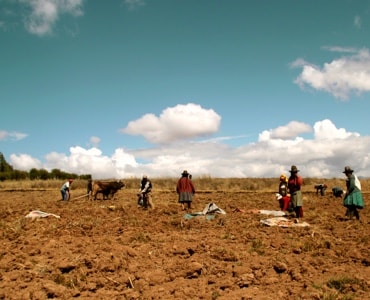

Promoting dialogue with affected communities
NGOs engage with companies and governments to promote adherence to and implementation of the Voluntary Principles through the development of strong corporate policies, practices and procedures. Affected populations are of paramount concern to NGOs who are best-placed to foster dialogue and collaboration between multiple stakeholders—including, most importantly, local communities—to ensure the successful implementation of the Voluntary Principles from the site level to the national level.
Enhanced advocacy, reciprocal learning, and access to new tools
Through participation in the Voluntary Principles Initiative, NGOs engage in dialogue, mutual learning and joint problem-solving regarding complex VPs implementation challenges. NGOs have played an important role in leading the development of tools and guidance notes to help improve and deepen implementation. They often bring to the table significant expertise and deep knowledge which allows them outsized influence and a lasting positive impact.
Improved advocacy opportunities
Membership allows NGOs to engage in and understand issues around security and human rights, improving their opportunities to advocate for change.
Mutual learning
By learning from other members, NGOs can better support all stakeholders, and especially communities, through their work on human rights, peace and security.
Implementation of new approaches
This offers opportunities to learn about tools and approaches related to the Voluntary Principles and human rights that can be incorporated into their work.
NGOs support implementation, raise awareness, and develop new policies
Civil society organizations fulfill a range of functions, including playing a “watchdog” role, strengthening the initiative’s governance accountability, providing expert policy advice, assisting with implementation, and representing the perspectives of specific stakeholders. NGO members should support efforts to strengthen human rights awareness, the rule of law and accountability mechanisms in the public security sector, providing expert advice and program support in this area. NGOs also play an important role in raising awareness and promoting understanding of the VPs among their various stakeholders.
Some NGOs additionally play a supporting role for companies in providing audit services, assessing implementation efforts, and commenting on the extent to which participants and external actors are fulfilling their responsibilities regarding security and human rights.
Roles and Responsibilities of NGOs
- Providing special expertise and knowledge, along with leadership to help shape the future of the initiative.
- Raising awareness of issues related to human rights and security that need to be addressed and helping companies and governments successfully implement the Principles.
- Helping companies to develop policies, procedures, and training that promote respect for human rights, while maintaining the security of workers and assets.
- Engaging with community groups to improve their understanding of human rights and increase awareness of the role that communities can play in ensuring their own security.
- Interacting with governments to increase awareness of the Principles and their value for the country.
- Reporting annually on activities to support implementation.
- Formally participating in the governance of the Initiative.
NGO Members of the Voluntary Principles Initiative and Useful Resources
-
African Law Foundation
CDA Collaborative Learning Projects
Centro Guaman Poma de Ayala – Engaged
Centro para Democracia e Direitos Humanos (CDD)
COMPPART
Foundation for the Conservation of the Earth (FOCONE)
The Fund for Peace
Global Rights – Engaged
Green Advocates
Human Rights and Forest Brain Africa (HURIFBA)
Human Rights Watch
Instituto de Enseñanza para el Desarrollo Sostenible (IEPADES)
IMPACT
International Alert
Jamaa Resource Initiatives – Engaged
Justicia ASBL – Engaged
LITE-Africa
Motherhen Development Foundation – Engaged
New Nigeria Foundation
Pact
PAX
Prisoners’ Rehabilitation and Welfare Action (PRAWA)
SaferGlobe
Search for Common Ground
USALAMA
West Africa Network for Peacebuilding, Ghana (WANEP) – Engaged

